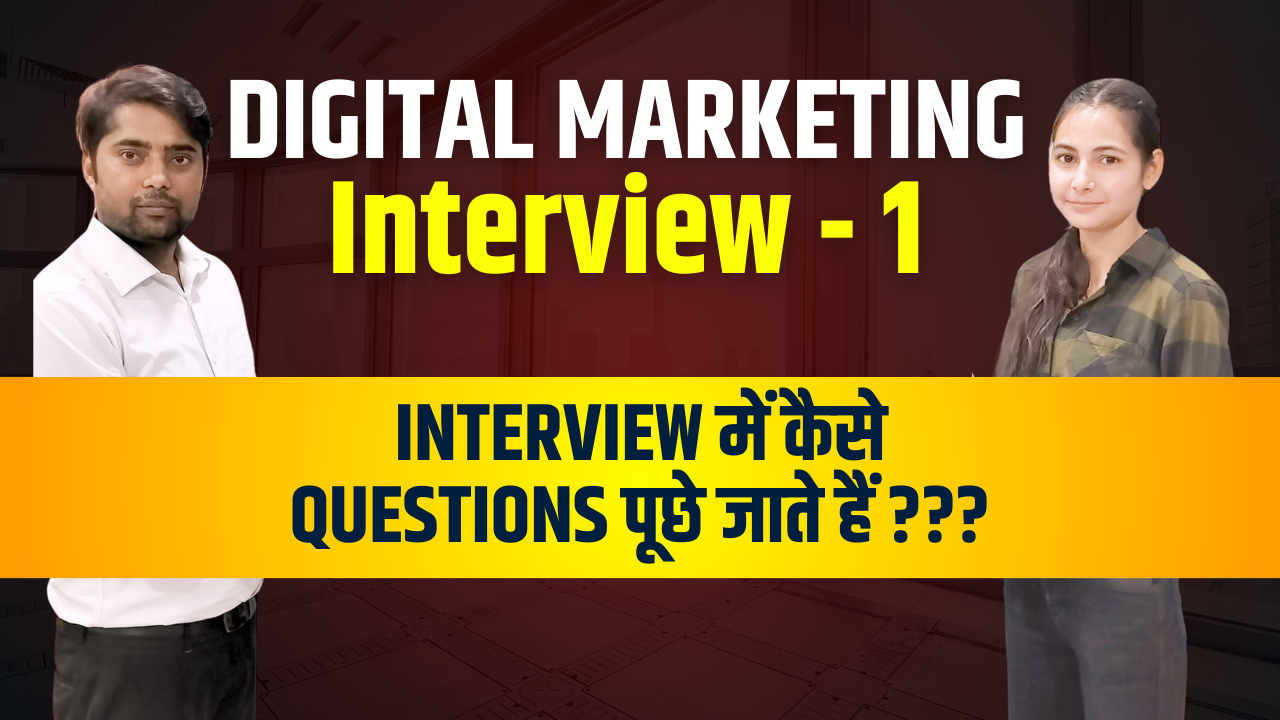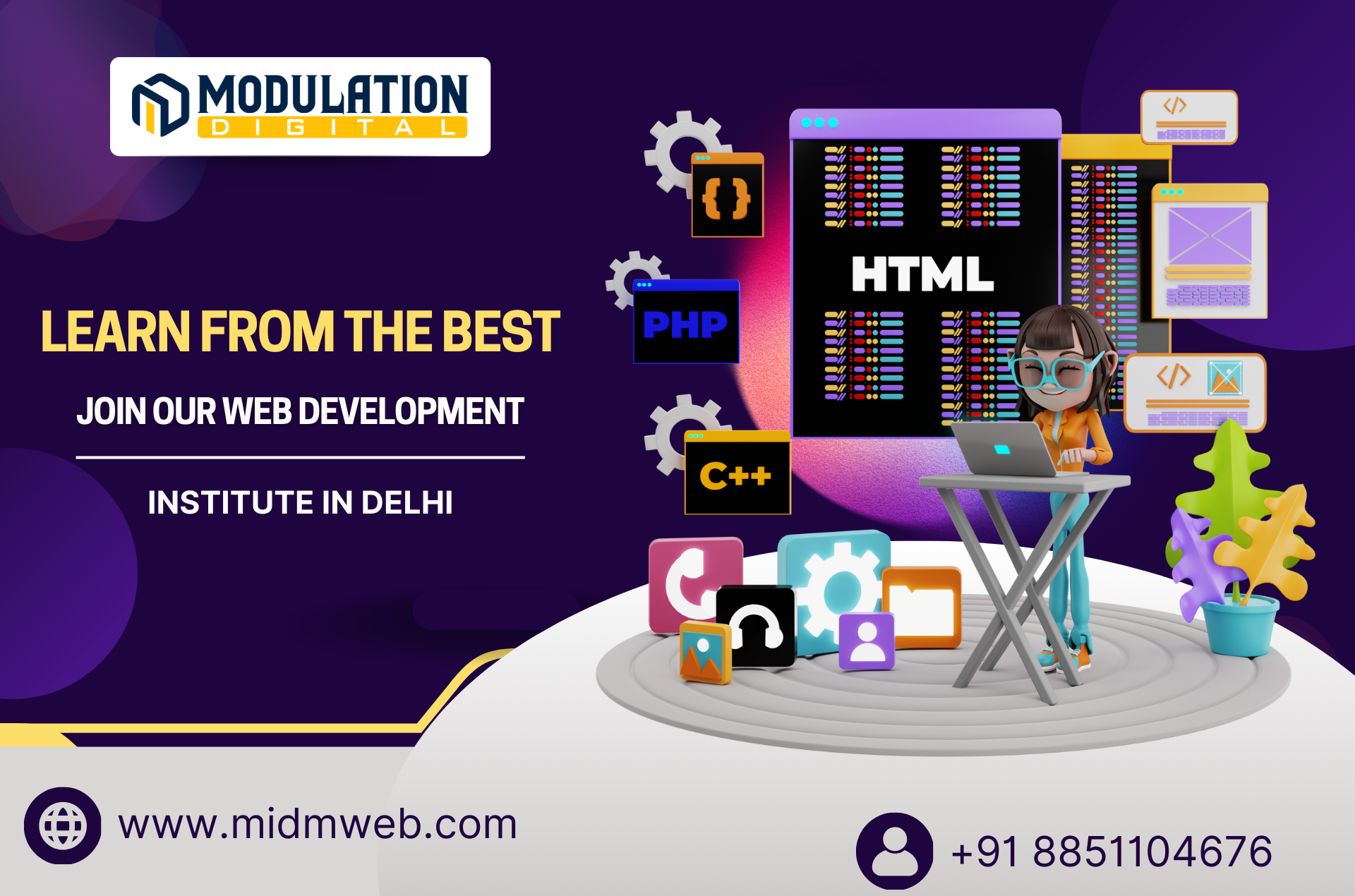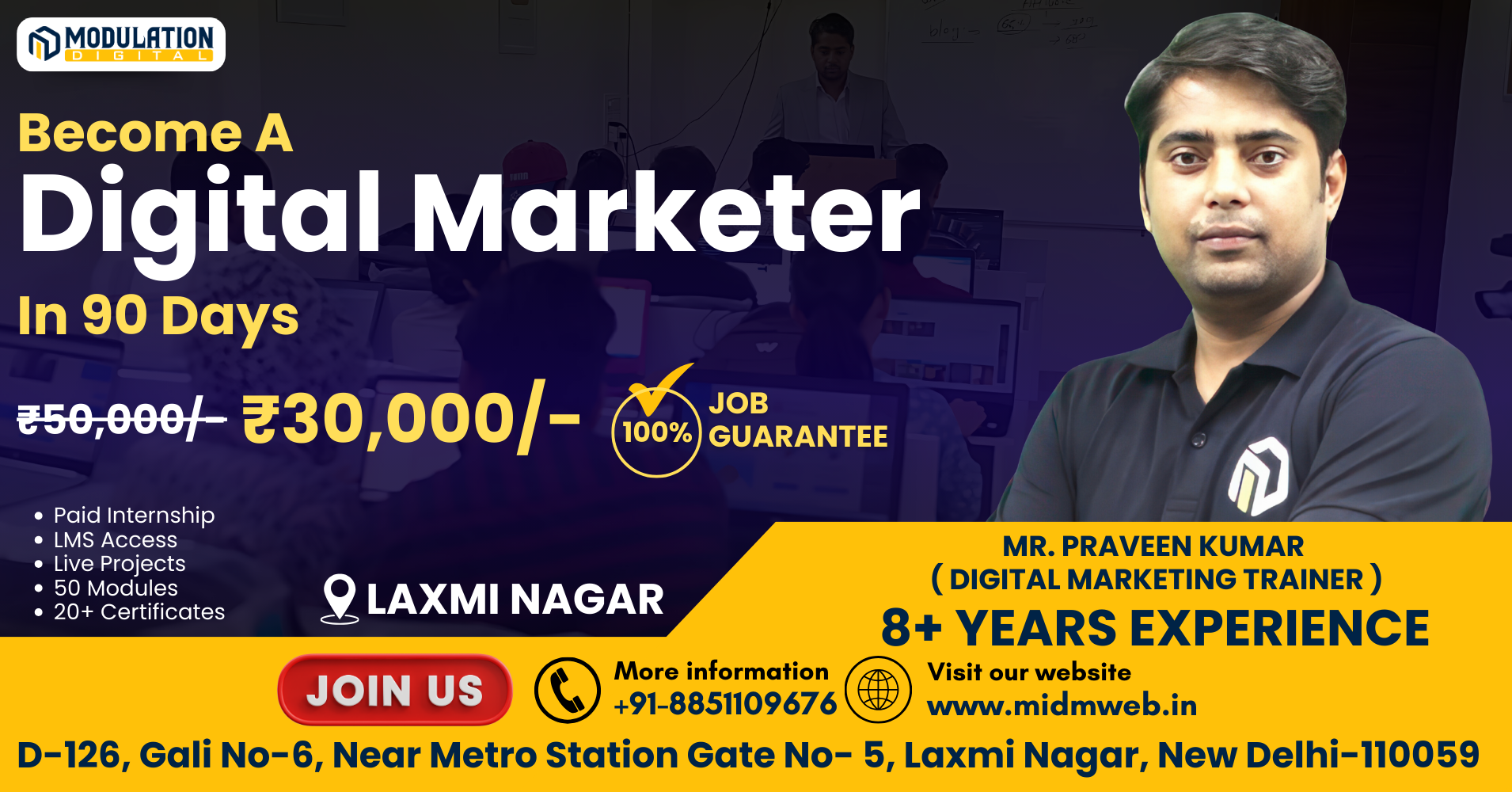
In today’s digital age, where businesses rely heavily on online channels to reach their target audience, the role of digital marketers has become increasingly vital. Digital marketing interviews serve as the gateway for individuals to showcase their knowledge, skills, and expertise in this dynamic field. Employers seek candidates who not only possess a strong understanding of digital marketing principles but also demonstrate creativity, problem-solving abilities, and adaptability to evolving trends. Therefore, mastering the art of the digital marketing interview is essential for securing lucrative career opportunities in this competitive industry.
Modulation Digital stands at the forefront of digital marketing education, offering comprehensive training programs designed to empower aspiring marketers with the skills and knowledge needed to excel in the field. Led by industry experts like Praveen Kumar, Modulation Digital boasts over 8 years of experience in delivering top-notch digital marketing training. With a focus on practical learning and real-world applications, Modulation Digital equips students with hands-on experience in SEO, PPC, social media marketing, analytics, and more. Through personalized guidance and industry-relevant curriculum, Modulation Digital ensures that students are not only prepared to ace their digital marketing interviews but also thrive in their careers as adept and confident professionals.
How to Crack Digital Marketing interviews:
Digital marketing interviews can be daunting, but with the right preparation and strategies, you can turn them into opportunities to shine. Whether you’re a fresher stepping into the industry or a seasoned professional aiming to advance your career, mastering the art of digital marketing interviews is essential for success. In this guide, we’ll explore actionable tips and techniques to help you crack your digital marketing interviews with confidence and poise.
1. Research Thoroughly:
- Understand the company: Research the company’s digital presence, its products/services, target audience, and competitors.
- Know the industry: Stay updated with the latest trends, technologies, and best practices in digital marketing.
2. Polish Your Resume and Portfolio:
- Highlight relevant skills and experiences related to digital marketing.
- Showcase successful campaigns, projects, or achievements that demonstrate your expertise.
3. Prepare for Common Interview Questions:
Practice answering common digital marketing interview questions, such as:
- “What is your understanding of SEO/PPC/social media marketing?”
- “How do you approach digital marketing analytics?”
- “Can you share an example of a successful digital marketing campaign you’ve worked on?”
4. Brush Up on Technical Skills:
- Ensure proficiency in key digital marketing tools and platforms, such as Google Analytics, Google Ads, Facebook Ads Manager, etc.
- Familiarize yourself with industry-specific terminology and concepts.
5. Demonstrate Problem-Solving Skills:
- Be prepared to tackle hypothetical scenarios or case studies related to digital marketing challenges.
- Showcase your ability to think critically, analyze data, and devise strategic solutions.
6. Showcase Your Passion and Enthusiasm:
- Express genuine interest and passion for digital marketing during the interview.
- Share insights, ideas, or experiences that reflect your enthusiasm for the field.
Essential Digital Marketing Interview Questions and Answers:
A. Top 10 SEO (Search Engine Optimization) interview question:
- What are the key components of on-page SEO optimization, and how do they contribute to improving search engine rankings?
- Can you explain the importance of keyword research in SEO, and how do you conduct keyword research for a website?
- What is the difference between white hat and black hat SEO techniques? Can you provide examples of each?
- How do you optimize website content for search engines while ensuring it remains valuable and relevant to users?
- What role do backlinks play in SEO, and how do you acquire high-quality backlinks for a website?
- Can you discuss the importance of site speed and mobile-friendliness in SEO, and how do you optimize a website for these factors?
- How do you approach technical SEO audits, and what are some common technical issues that can impact a website’s search visibility?
- Can you explain the concept of SEO metadata, including title tags, meta descriptions, and header tags, and how do you optimize them for better search engine performance?
- What strategies would you implement to improve local SEO for a brick-and-mortar business targeting specific geographic locations?
- How do you measure the success of an SEO campaign, and what key performance indicators (KPIs) do you track to evaluate its effectiveness over time?
B. Top 10 PPC (Pay-Per-Click) Advertising interview question:
- What is PPC advertising, and how does it differ from other digital advertising models like CPM or CPA?
- Can you explain the concept of ad rank in PPC advertising, and how is it calculated in platforms like Google Ads?
- How do you conduct keyword research for a PPC campaign, and what factors do you consider when selecting keywords?
- What are ad extensions, and how do they enhance the performance of PPC ads? Can you provide examples of different types of ad extensions?
- How do you create compelling ad copy for PPC ads that effectively captures the attention of your target audience and encourages clicks?
- Can you discuss the importance of landing page optimization in PPC advertising, and what elements should be included on a high-converting landing page?
- What bidding strategies are available in PPC advertising, and how do you determine which bidding strategy to use for a particular campaign?
- How do you track and measure the performance of a PPC campaign, and what key metrics do you analyze to assess its effectiveness?
- What are negative keywords, and why are they important in PPC advertising? How do you identify and implement negative keywords in a campaign?
- Can you discuss the significance of ad testing and optimization in PPC advertising? What methods do you use to test different ad variations and optimize campaign performance?
C. Top 10 Social Media Marketing interview question:
- How do you define social media marketing, and what role does it play in a company’s overall marketing strategy?
- Can you discuss the importance of audience targeting in social media marketing, and how do you segment and target different audience groups effectively?
- What are the main objectives of a social media marketing campaign, and how do you align them with the goals of the business?
- Can you explain the concept of engagement on social media platforms, and what strategies do you employ to increase audience engagement with your content?
- How do you select the most appropriate social media platforms for a company’s marketing efforts, and what factors do you consider when making this decision?
- Can you discuss the significance of content strategy in social media marketing, and how do you plan and create engaging content for different social media channels?
- What is influencer marketing, and how do you identify and collaborate with influencers to enhance a brand’s presence on social media?
- How do you measure the success of a social media marketing campaign, and what key performance indicators (KPIs) do you track to evaluate its effectiveness?
- Can you discuss the importance of community management in social media marketing, and how do you foster a positive community around a brand on social media?
- What are some common challenges faced in social media marketing, and how do you overcome them to achieve your marketing objectives?
D. Top 10 Full Digital Marketing Interview Question
- Can you provide an overview of your experience and background in digital marketing?
- What do you consider to be the most important components of a successful digital marketing strategy?
- How do you stay updated with the latest trends and changes in the digital marketing landscape?
- Can you discuss a successful digital marketing campaign you’ve managed in the past and the strategies you employed to achieve its objectives?
- What are your thoughts on the role of content marketing in a digital marketing strategy, and how do you approach content creation and distribution?
- How do you measure the ROI (Return on Investment) of digital marketing initiatives, and what metrics do you typically track to evaluate performance?
- Can you discuss the importance of SEO (Search Engine Optimization) in digital marketing, and how do you optimize website content for better search engine visibility?
- What strategies do you employ to engage and grow an audience on social media platforms, and how do you measure the success of your social media efforts?
- How do you approach email marketing campaigns, and what tactics do you use to increase open rates and conversions?
- Can you discuss the role of data analytics in digital marketing, and how do you use data to inform decision-making and optimize marketing strategies?
Tips for Acing Your Digital Marketing Interview:
A. Showcase your passion for digital marketing
Demonstrating your passion for digital marketing is essential during an interview. Here are some ways to effectively showcase your enthusiasm for the field:
- Share Your Journey: Discuss how you developed an interest in digital marketing and what inspired you to pursue it as a career. Share personal anecdotes or experiences that highlight your passion for the industry.
- Highlight Relevant Projects: Talk about digital marketing projects or campaigns you’ve worked on outside of your professional experience, such as personal blogs, social media accounts, or volunteer initiatives. This demonstrates your genuine interest in the field beyond your job responsibilities.
- Stay Updated: Mention how you actively stay informed about the latest trends, developments, and best practices in digital marketing. Discuss the blogs, podcasts, industry publications, or online courses you follow to expand your knowledge and skills.
- Engage in Online Communities: Participate in online forums, discussion groups, or social media communities related to digital marketing. Share insights, ask questions, and contribute to conversations to demonstrate your passion for the field and eagerness to learn from others.
- Volunteer or Freelance Work: Describe any volunteer opportunities or freelance projects you’ve taken on related to digital marketing. Discuss how these experiences allowed you to apply your skills in a real-world setting and further fuel your passion for the industry.
- Discuss Long-Term Goals: Share your aspirations and long-term career goals within the digital marketing field. Whether it’s advancing to a leadership position, starting your own agency, or specializing in a specific area, articulating your vision demonstrates your commitment to the industry.
- Express Enthusiasm: Throughout the interview, convey your excitement and enthusiasm for digital marketing through your tone of voice, body language, and facial expressions. Let your passion shine through in your words and actions to leave a lasting impression on the interviewer.
By effectively showcasing your passion for digital marketing, you can convey your genuine interest in the field and your eagerness to contribute to the success of the organization.
B. Highlight your relevant experience and achievements
Highlighting your relevant experience and achievements is crucial during a digital marketing interview. Here’s how you can effectively showcase your qualifications:
- Emphasize Past Successes: Discuss specific projects or campaigns you’ve worked on that demonstrate your expertise in digital marketing. Highlight any measurable results or achievements, such as increased website traffic, higher conversion rates, or improved brand visibility.
- Quantify Your Accomplishments: Whenever possible, quantify the impact of your work using metrics or key performance indicators (KPIs). For example, you might mention that you increased social media engagement by 50% or boosted email open rates by 20%.
- Showcase Your Skills: Highlight your proficiency in key digital marketing areas, such as SEO, PPC, social media marketing, content marketing, email marketing, and analytics. Provide examples of how you’ve applied these skills to drive results for previous employers or clients.
- Demonstrate Adaptability: Discuss your ability to adapt to changing trends and technologies in the digital marketing landscape. Highlight instances where you successfully implemented new strategies or adopted emerging platforms to stay ahead of the curve.
- Share Positive Feedback: If you’ve received praise or recognition for your work from colleagues, clients, or supervisors, don’t hesitate to mention it. Positive feedback can help validate your expertise and reinforce your credibility as a digital marketer.
- Discuss Professional Development: Highlight any relevant certifications, training programs, or courses you’ve completed to further your digital marketing knowledge and skills. This demonstrates your commitment to continuous learning and professional growth.
- Tailor Your Examples: Customize your responses to align with the specific requirements of the job you’re interviewing for. Focus on experiences and achievements that directly relate to the role and showcase your suitability for the position.
C. Demonstrate your problem-solving skills and creativity
Highlighting your problem-solving skills and creativity during a digital marketing interview can set you apart from other candidates. Here’s how to effectively demonstrate these qualities:
- Discuss Past Challenges: Share examples of specific challenges or obstacles you’ve encountered in your digital marketing projects or campaigns. Describe how you identified the problem, analyzed its root causes, and developed creative solutions to overcome it.
- Showcase Innovative Ideas: Present innovative ideas or strategies you’ve implemented to achieve your marketing objectives. Whether it’s a unique content concept, a creative campaign theme, or a novel approach to audience targeting, highlight your ability to think outside the box and generate inventive solutions.
- Provide Case Studies: Offer detailed case studies or success stories that showcase your problem-solving skills and creativity in action. Discuss the strategies you devised, the tactics you employed, and the results you achieved, emphasizing the ingenuity and resourcefulness behind your approach.
- Describe Collaboration: Talk about instances where you collaborated with cross-functional teams or external partners to solve complex marketing challenges. Highlight your ability to leverage diverse perspectives, brainstorm ideas, and collectively find innovative solutions to overcome obstacles.
- Present Tangible Results: Quantify the impact of your problem-solving efforts by highlighting measurable outcomes or achievements. Whether it’s increased website traffic, higher conversion rates, or improved brand engagement, demonstrate how your creative solutions translated into tangible results for your organization.
- Showcase Adaptability: Illustrate your ability to adapt to changing circumstances and unexpected challenges in the dynamic digital marketing landscape. Discuss how you quickly pivoted strategies, adjusted tactics, and embraced new technologies to address emerging issues and seize opportunities.
- Highlight Continuous Improvement: Emphasize your commitment to continuous learning and improvement in your problem-solving approach. Discuss how you reflect on past experiences, seek feedback, and proactively seek out new knowledge and skills to enhance your problem-solving capabilities over time.
By effectively demonstrating your problem-solving skills and creativity, you can showcase your ability to tackle complex marketing challenges, drive innovation, and deliver impactful results in the ever-evolving world of digital marketing.
D. Ask thoughtful questions to the interviewer
Asking thoughtful questions to the interviewer not only demonstrates your genuine interest in the position and the company but also helps you gather valuable insights to make an informed decision about the role. Here are some examples of thoughtful questions to ask:
- Can you tell me more about the company culture and what it’s like to work here?
- What are the biggest challenges facing the digital marketing team/company right now, and how do you envision this role contributing to addressing those challenges?
- Can you walk me through a typical day or week in this role?
- What opportunities are there for professional development and advancement within the digital marketing team/company?
- How does the digital marketing team collaborate with other departments within the organization?
- Can you provide more information about the company’s approach to digital marketing strategy and the specific goals or objectives for this role?
- What qualities or attributes do you believe are most important for someone to succeed in this role?
- How does the company measure success in digital marketing initiatives, and what key performance indicators (KPIs) are used to evaluate performance?
- Can you share examples of recent successful digital marketing campaigns or projects the company has undertaken?
- What is the team’s approach to experimentation and innovation in digital marketing, and how does this role contribute to driving innovation within the team/company?
By asking thoughtful questions, you not only gain valuable insights into the role and the company but also demonstrate your curiosity, critical thinking skills, and genuine interest in contributing to the organization’s success.








